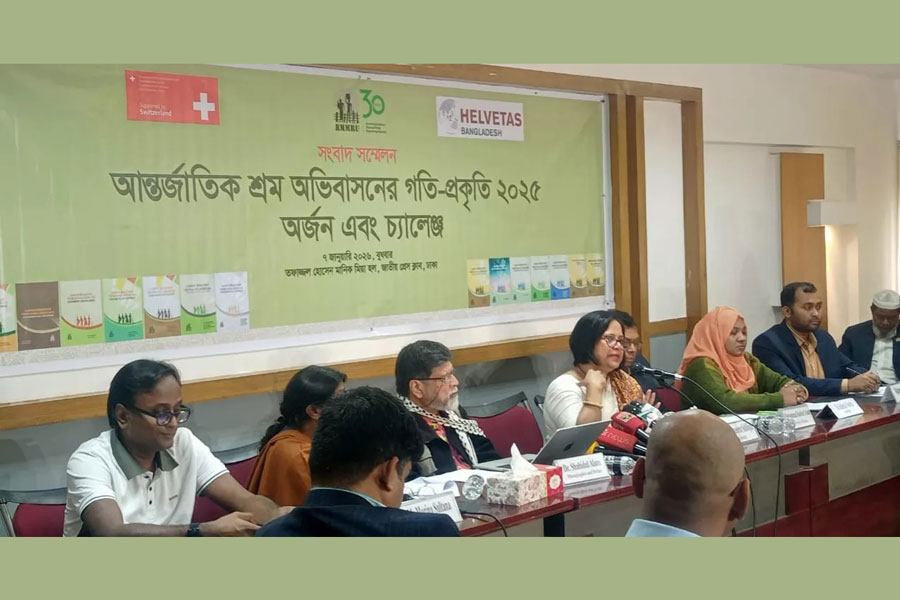Saif
Senior Member
- Joined
- Jan 24, 2024
- Messages
- 17,262
- Likes
- 8,334
- Nation

- Residence

- Axis Group


Protect migrant workers from fraudulent recruitment
OKUP findings deserve critical scrutiny
Protect migrant workers from fraudulent recruitment
OKUP findings deserve critical scrutiny

VISUAL: STAR
The scale of the exploitation our migrant workers have faced over the years is truly shocking. A recent study by the Ovibashi Karmi Unnayan Program (OKUP), based on 114 case studies of workers who sought legal help between January 2023 and October 2024, sheds light on just how systemic and devastating this exploitation has been. While the sample size may be modest, the patterns it reveals are consistent with what has long been reported anecdotally and through media investigations, pointing to a deeply entrenched and institutional neglect of responsibility in protecting our migrant workers.
As per the OKUP study, 36 percent of workers were forced to return home within just three months of migrating, crushing their hopes of a better future and even leaving many in deeper debt. Such abrupt, premature returns are only one side of a much larger problem, however. It includes contract substitution, lack of work permits, extortionate migration costs, etc. For example, 75 percent of workers left Bangladesh without receiving any prior employment contract while, shockingly, not a single female migrant received one before departure. Even among the 25 percent who did receive contracts, most got them just hours before their flight. Upon arrival, 47 percent of all migrants were denied work permits, and among those who received permits, only 24 percent were actually given the jobs they had been promised.
These findings point to a systematic betrayal of workers at every stage of the migration process, both at home and abroad. One revelation that almost all can relate to is that every male worker surveyed was charged migration fees well beyond the legal limits—often double for those heading to Saudi Arabia and six times higher for Malaysia. This is significant because these two countries are key destinations for our workers. Malaysia, in particular, has been in the news of late for exploitation-related cases. For instance, in May, 33 Bangladeshi workers filed a case in a Malaysian court against a recruitment firm and several government officials for alleged fraud. They said they were victims of human trafficking and job scams. In the first four months of 2025, over 3,500 Bangladeshis were also reportedly denied entry and sent back from Kuala Lumpur, many victims of such job scams. Also in May, another company revoked work permits of Bangladeshi workers after they aired concerns about its poor working conditions.
The OKUP study also raises serious questions about the effectiveness of the arbitration system for affected workers. While questioning the role of the Bureau of Manpower, Employment and Training (BMET) as being responsible for both issuing recruitment licences and settling disputes—an inherent conflict of interest—it reveals that there is currently no fair mechanism to ensure justice and no clearly defined standards for compensation or remedies. All these issues are interconnected and need to be resolved simultaneously to ensure the whole migration process is above board. OKUP's recommendations in this regard deserve serious consideration.
It is high time the interim government took comprehensive measures together with the authorities of destination countries to clean up this long-neglected process. Our migrant workers deserve dignity, protection, and justice. We must not let them be exploited any longer.
OKUP findings deserve critical scrutiny
VISUAL: STAR
The scale of the exploitation our migrant workers have faced over the years is truly shocking. A recent study by the Ovibashi Karmi Unnayan Program (OKUP), based on 114 case studies of workers who sought legal help between January 2023 and October 2024, sheds light on just how systemic and devastating this exploitation has been. While the sample size may be modest, the patterns it reveals are consistent with what has long been reported anecdotally and through media investigations, pointing to a deeply entrenched and institutional neglect of responsibility in protecting our migrant workers.
As per the OKUP study, 36 percent of workers were forced to return home within just three months of migrating, crushing their hopes of a better future and even leaving many in deeper debt. Such abrupt, premature returns are only one side of a much larger problem, however. It includes contract substitution, lack of work permits, extortionate migration costs, etc. For example, 75 percent of workers left Bangladesh without receiving any prior employment contract while, shockingly, not a single female migrant received one before departure. Even among the 25 percent who did receive contracts, most got them just hours before their flight. Upon arrival, 47 percent of all migrants were denied work permits, and among those who received permits, only 24 percent were actually given the jobs they had been promised.
These findings point to a systematic betrayal of workers at every stage of the migration process, both at home and abroad. One revelation that almost all can relate to is that every male worker surveyed was charged migration fees well beyond the legal limits—often double for those heading to Saudi Arabia and six times higher for Malaysia. This is significant because these two countries are key destinations for our workers. Malaysia, in particular, has been in the news of late for exploitation-related cases. For instance, in May, 33 Bangladeshi workers filed a case in a Malaysian court against a recruitment firm and several government officials for alleged fraud. They said they were victims of human trafficking and job scams. In the first four months of 2025, over 3,500 Bangladeshis were also reportedly denied entry and sent back from Kuala Lumpur, many victims of such job scams. Also in May, another company revoked work permits of Bangladeshi workers after they aired concerns about its poor working conditions.
The OKUP study also raises serious questions about the effectiveness of the arbitration system for affected workers. While questioning the role of the Bureau of Manpower, Employment and Training (BMET) as being responsible for both issuing recruitment licences and settling disputes—an inherent conflict of interest—it reveals that there is currently no fair mechanism to ensure justice and no clearly defined standards for compensation or remedies. All these issues are interconnected and need to be resolved simultaneously to ensure the whole migration process is above board. OKUP's recommendations in this regard deserve serious consideration.
It is high time the interim government took comprehensive measures together with the authorities of destination countries to clean up this long-neglected process. Our migrant workers deserve dignity, protection, and justice. We must not let them be exploited any longer.








































